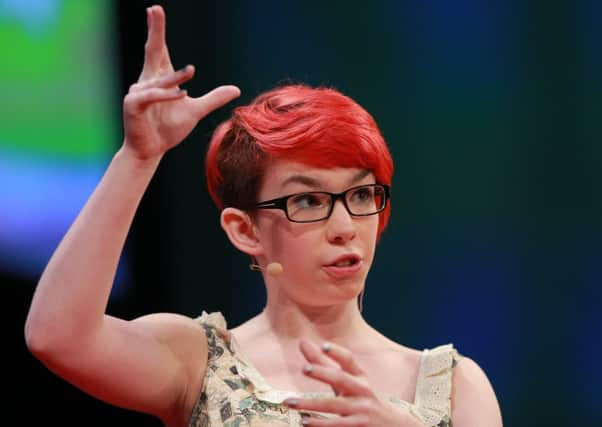How Rosie changed a million people’s ideas of austism


Sixteen-year-old Rosie King stands alone on the stage of the John F Kennedy Centre for Performing Arts in Washington DC, an invited audience of 1,000 academics and scientists hanging on her every word.
The A-level student from Horbury, near Wakefield, is in America to deliver a TED (Technology, Entertainment, Design) talk – her subject: How Autism Freed me to Be Myself. Understandably Rosie is nervous and her voice wobbles momentarily as she begins her delivery but within seconds she takes a deep breath, overcomes her nerves and she doesn’t falter once during the six-minute speech which is streamed live to 150 countries throughout the world. So far, more than one million people have listened in to Rosie’s speech online and the numbers are growing each day. This feat from one so young is all the more remarkable when you discover that Rosie has Asperger’s, a form of autism which often makes it difficult for those affected by the condition to engage with their peers and frequently causes anxiety issues.
Advertisement
Hide AdAdvertisement
Hide AdRosie has worked hard throughout her life to change other people’s pre-conceptions of her condition and told the delegates at TED: “People often associate autism with liking maths and science and nothing else, but I know so many autistic people who love being creative.
“But that is a stereotype, and the stereotypes of things are often, if not always, wrong. For instance, a lot of people think autism and think Rain Man immediately.
“That’s the common belief, that every single autistic person is Dustin Hoffman, and that’s not true.”
Rosie, by her own admission, has a very vivid imagination and is incredibly creative. She is studying for A levels in media, film studies, English and drama; plays the guitar, draws and paints and has been writing stories and poems since she was very young. She’s finished writing one book, is midway through five or six others and, when she was 12, illustrated a children’s book published by her mother Sharon, the central character of which has autism. I met Rosie four months after her visit to America, in the home she shares with Sharon, her father Richard and two severely autistic siblings, Lenny, 13, and Daisy, 14. The shock of red hair, the black rimmed glasses and the smart dress she sported in Washington have gone, instead Rosie looks like a typical teenager wearing jeans, one of her mum’s grunge rock T-shirts and with fetching blue streaks in her hair. When she’s not at college in Pontefract she writes books and listens to music; David Bowie is one of her favourite artists. Her younger siblings were diagnosed with autism at an early age but Rosie was 10-years-old when she first recognized the symptoms in herself after reading a book on the subject.
Advertisement
Hide AdAdvertisement
Hide AdSharon and Richard took her to see a specialist and, after a year-long process, the official diagnose of mild Asperger’s came back. But rather than holding her back, Rosie has embraced her condition and says she wouldn’t change it for the world.
“Because I am autistic, I’ve presented documentaries for the BBC,” she says. “One of the best things that I’ve achieved is I’ve found ways of communicating with my little brother and sister, who are nonverbal.” The documentary in question was a special BBC Newsround documentary My Autism and Me which examined how children with autism are portrayed, how they can often feel isolated and alone, be bullied at school and fail to find full-time employment once they leave mainstream education. It won a whole host of awards including an international Emmy and a Royal Television Society award and led to Rosie being invited to speak at the Washington conference.
The care she gives to her brother and sister and the help she gives her parents saw Rosie being nominated for a Yorkshire Children of Courage award last year. But modestly, she plays down her achievements saying it’s just older sister duties and that she treats her siblings like anybody else. Sharon, who nominated Rosie for the Young Carer award does not agree: “Above all else, Rosie is a loving sister and daughter. She always speaks up if someone behaves badly towards her brother and sister, but does so with a maturity and sense of understanding beyond her years. “She is also a tower of strength to me. When I’m feeling down she is there to reassure me and volunteers to help with Daisy and Lenny’s day to day needs.”
Celebrating uniqueness in individuals is core to Rosie’s message and she finds the desire to be normal to be a baffling concept. “Imagine if ‘You are normal’ was the best compliment you ever received,” she says.
Advertisement
Hide AdAdvertisement
Hide Ad“Compliments should be more like, ‘you are extraordinary’ or ‘you’re amazing.’ So if people want to be these things, why are so many people striving to be normal? Why are people pouring their brilliant individual light into a mould?
“People are so afraid of variety that they try and force everyone, even people who don’t want to or can’t, to become normal.”
Next on the agenda is a trip to Geneva in March: Rosie and Sharon have been invited to speak at a TEDx event – a privately organized offshoot of TED.
Sharon will deliver a lecture on nonverbal communication but Rosie is keeping the subject of her speech under wraps for the time being. As Rosie is still only 16, there’s plenty of time yet for her to map out her life. For now though she’s adamant that she wants to be a writer of books and scripts for film and TV.
Advertisement
Hide AdAdvertisement
Hide Ad“If we can’t get inside the person’s minds, no matter if they’re autistic or not, instead of punishing anything that strays from normal, why not celebrate uniqueness and cheer every time someone unleashes their imagination?”